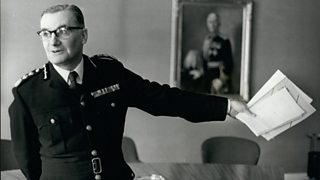Bent Coppers: Crossing the Line of Duty
The real story behind AC-12
As record audiences continue to be gripped by Line of Duty and speculation around the identity of ‘H’ - the mysterious bent copper who controls a shadowy organised crime group - reaches fever pitch, a new 91�ȱ� TWO documentary series Bent Coppers: Crossing The Line of Duty reveals some of the true stories of the police anti–corruption officers of the 1970s who were the first to take on the fight to stop the rot.

As the 1970s dawned, London was a city under threat from drugs, pornography and violent robbery. But behind the chaos lay a sinister hidden truth. Amongst honest officers, a secret network of bent coppers known as the firm in a firm operated with impunity across London.
This was a time of larger than life characters, bent coppers, porn barons, villains, brave whistle blowers, supergrasses and a tenacious Police Chief who would stop at nothing in his search for corruption at the highest levels inside the force. It was a time of bribes, racketeering and when ‘taking a drink’ meant receiving brown envelopes stuffed with cash.
But was there just one rotten apple? Or was the whole barrel bad? Here are some of the true stories of bent coppers, and those who were tasked with catching them.
The Firm in a Firm
In 1969, a petty South London criminal tipped off the Times newspaper that he was being extorted for money, not by other criminals, but by a detective in the Metropolitan police.
Journalists concealed a recording device in his car as he secretly met D.S John Symonds who revealed a hidden world of police corruption of a ‘firm in a firm’ and boasted ‘we’ve got more villains in our game than you’ve got in yours.’
When the explosive article was published in November 1969, it exposed a hidden world of corrupt officers, faked evidence, bribery and blackmail.
A10: The Real AC 12
Robert Mark became Commissioner of London’s Metropolitan Police force in 1972. He said he wanted a CID that “catches more criminals than it employs” and one of his very first actions was to set up Britain’s first specialist anti-corruption police unit, A10. This new branch put fear into the heart of corrupt CID detectives and was there to destroy the corrupt traditions of the firm in a firm.
It was the beginning of Mark’s extraordinary battle against his own detectives that would make him a hero for some and a pariah to others. Under his leadership between 1972-1977, nearly 500 police officers were either prosecuted, dismissed or forced to resign.
The Dirty Squad
A10’s biggest single investigation was into powerful allegations against senior commanders from the Met’s Obscene Publications Squad, known as the Dirty Squad. Tasked with enforcing the Obscene Publications Act of 1959, instead it was alleged that the squad were effectively running their own protection racket in Soho, taking bribes from porn barons like Jimmy Humphreys.
One of the newspaper scoops of the 1970s exposed Kenneth Drury, commander of the world famous Flying Squad as having been Humphrey’s guest on a luxury all-expenses-paid Mediterranean holiday with their wives.
When Humphreys’ house was raided, they found his diary, which contained detailed records of payments that went into tens of thousands of pounds to many high-ranking officers.
When confronted with his wrongdoing, Drury defended his fraternising with criminals by saying ‘It’s no good going to the vicar’s tea party and trying to gain information about the activities of organised teams of robbers’.
A10’s investigation resulted in 18 officers being sentenced to more than a 100 years imprisonment.
Operation Countryman
A10 branch had been rooting out bent coppers inside the Metropolitan Police, but over in the City of London, which was outside their jurisdiction, it was a very different story.
In a bold and radical move, another force was called in to investigate. Spending 4 years, over £4 million and bringing in nearly 100 detectives from regional forces, Operation Countryman was the biggest internal investigation into police corruption the nation had ever seen.
In the late 1970s, rumours emerged from the underworld that huge sums of money had been paid to corrupt detectives to water-down evidence and arrange bail in three high profile cases of armed robbery. This included a payroll heist in which a security guard was shot dead and nearly £200,000 stolen, the equivalent of over a million pounds in today’s money.
In a bold and radical move, another force was called in to investigate. Spending 4 years, over £4 million and bringing in nearly 100 detectives from regional forces, Operation Countryman was the biggest internal investigation into police corruption the nation had ever seen.
Mockingly dubbed ‘The Sweedy’, the regional investigators were viewed by some London police officers as inept and out of their depth, but they cried foul play, claiming that their work was being obstructed and that the rot went to the very top.
The Real ‘H’ and AC-12?
The corruption scandals that dogged London radically changed the British police.
Anti-corruption units have become a vital part of policing. And the bitter battle against bent coppers goes on to this day.
BENT COPPERS: CROSSING THE LINE OF DUTY 91�ȱ� TWO, 9PM FROM WEDNESDAY 14TH APRIL
SERIES DIRECTOR – TODD AUSTIN
EXECUTIVE PRODUCER – MIN CLOUGH
91�ȱ� COMMISSIONING EDITOR – ABIGAIL PRIDDLE
